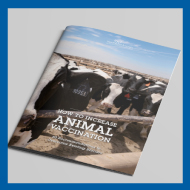Report identifies barriers to vaccination

Comprehensive report reveals much to be done on vaccination
A recently released report, How to Increase Animal Vaccination, identifies the six major barriers that limit uptake of vaccines around the globe – economic, political, technical and scientific, regulatory, social and perception, and field-use barriers.
The comprehensive report, published by HealthforAnimals, analyses the underlying issues within each barrier and offers 80 clear, actionable recommendations to address them.
It appears that pet vaccination in developed nations is high, but ‘herd immunity’ may be at risk. Companion animal ownership is high in these regions and owners will invest in pet care. As a result, overall vaccination rates are reasonable-to-good; but warning signs are emerging.
In the UK, 25 per cent of dogs have never been vaccinated, and in the US, 17 per cent of owners thought vaccination was unnecessary. There are concerns in Europe and the US that the levels of vaccinated dogs and cats has fallen below the levels necessary for ‘herd immunity’.
Pet vaccination in emerging economies, especially in Asia, is generally negligible. Some vaccination of individually owned pet dogs happens in urban areas. Rabies vaccination campaigns for stray animals also occurs in areas of East Africa and South Asia.
The report concludes that pet owners often make cost-benefit choices based on perceived risk of illness. For example, an owner may decide to vaccinate their dog since it plays with other dogs, but not vaccinate their cat because it only goes into the garden. They set this perceived risk against the cost of an annual vaccination.
In the UK, the BSAVA has confirmed that approximately 25 per cent of dogs and 35 per cent of cats receive no primary vaccination course – the lowest level they have recorded and below ‘herd immunity’ levels.



 The Veterinary Medicines Directorate (VMD) is inviting applications from veterinary students to attend a one-week extramural studies (EMS) placement in July 2026.
The Veterinary Medicines Directorate (VMD) is inviting applications from veterinary students to attend a one-week extramural studies (EMS) placement in July 2026.